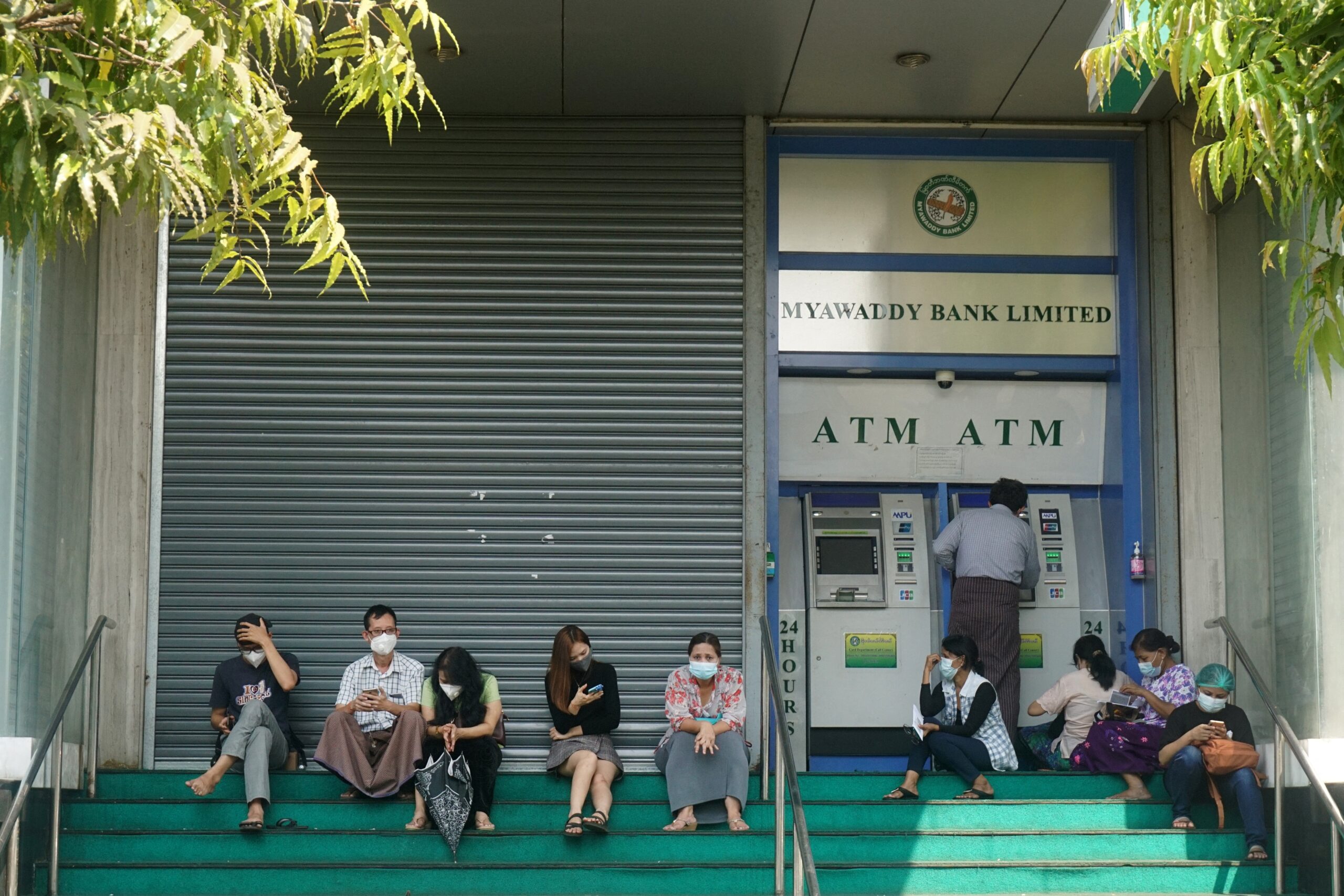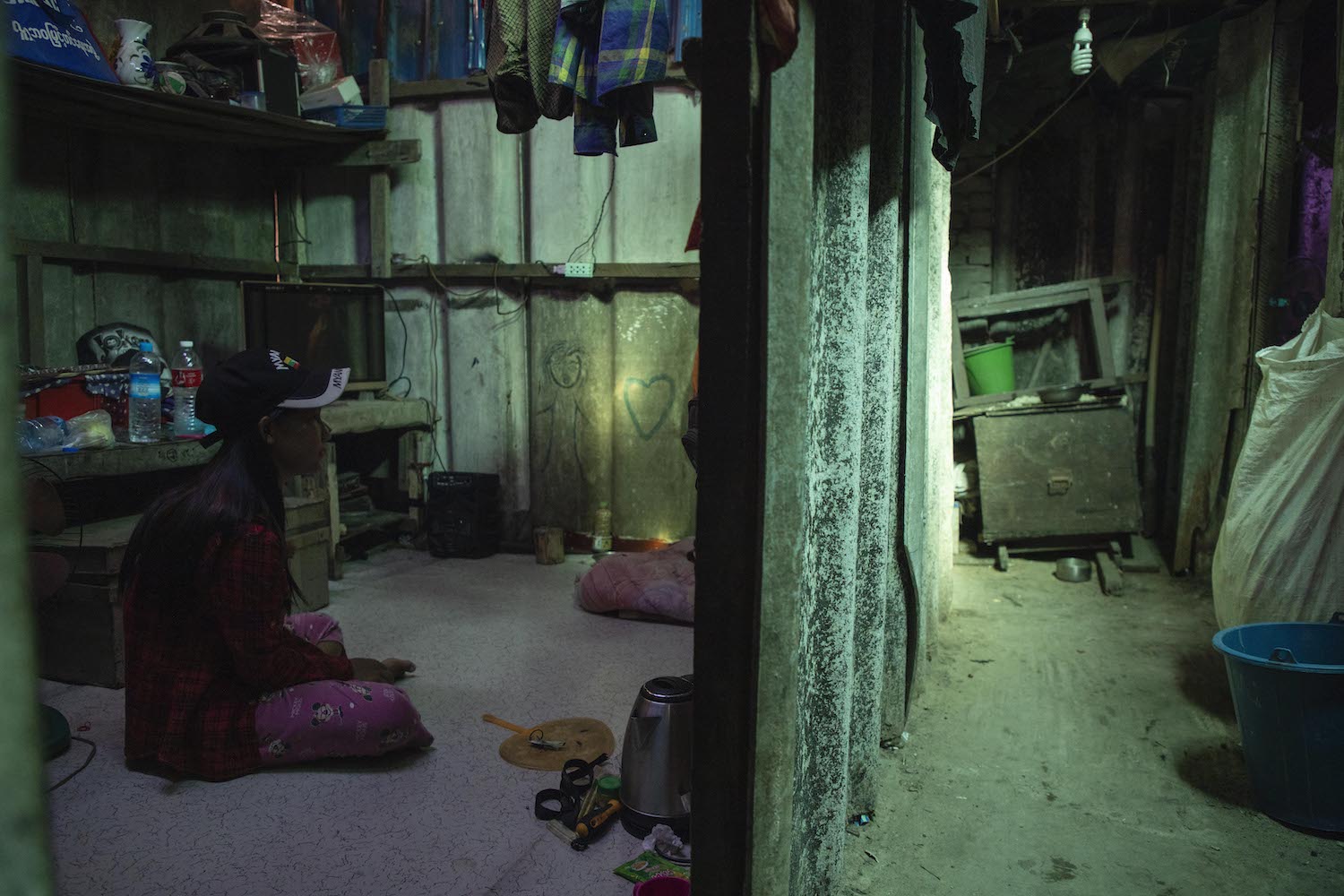Htet Myet Oo poses in Rangoon Tea House, a restaurant in Yangon he started with two partners. At first, he relied on funds acquired from buying and selling property. (Andre Malerba / Frontier)
Raising capital has long been a problem for Myanmar’s entrepreneurs, but the banking sector has begun taking steps to unleash the huge growth potential of the financial sector.
By WIN KYAW OO | FRONTIER
Ko Htet Myat Oo returned to Myanmar in 2011 and has been making waves as one of Yangon’s new generation entrepreneurs.
A graduate of City University London, Ko Htet Myat Oo, 25, dabbled in various businesses before he launched the upmarket Rangoon Tea House with two partners in 2014.The restaurant, on Pansodan Street in downtown Yangon, aims to recreate the atmosphere of the city’s tea shops during the British colonial era.
“I wanted to do something with food, which could turn back time so you could see the old Rangoon through the menu,” said Ko Htet Myat Oo. “You can look at all different walks of life, and envision who lived in Yangon [back then].”
After initially incurring losses, the Rangoon Tea House has proven successful and is attracting a mix of expatriates and Myanmar customers.
Support more independent journalism like this. Sign up to be a Frontier member.
The restaurant boasts an extensive menu, with ingredients coming from as far as Shan State, a well-stocked bar and a souvenir shop. It’s a bit too luxurious for a traditional tea shop of yore, and in a finance-challenged market such as Myanmar, a question that quickly comes to mind is how the funds were raised to invest in such a polished establishment.
Ko Htet Myat Oo said he relied on funds accumulated from buying and selling property while he lived in London and, after he returned to Myanmar, earnings from a sideline business importing luxury cars. He also persuaded two other Myanmar “repats”, citizens who returned home after the change of government in 2011, to help finance the restaurant.
Bank loans were not really an option.
“We young people do not have much property, so we have to use our own savings as well as savings from partners,” Ko Htet Myat Oo told Frontier. That’s pretty much the norm for young entrepreneurs in emerging Myanmar.
“It’s mainly family and friends funding, or mortgage if you have property,” said Daw Thiri Thant Man, managing director of Sandanila, a Yangon-based consultancy that provides advice on bringing capital into Myanmar. “Early stage funding is not so well developed,” she said.
Project funding is still in its infancy in Myanmar, as is the banking system. A 2014 report by the United Nations Capital Development Fund found that only five percent of the population has a bank account, and only 19 percent of the adult population borrows from regulated institutions, mainly government-run banks. The only option for many borrowers is the high cost of relying on money lenders, who have been estimated by one study to number more than 400,000 throughout the country.
One of the country’s biggest private banks, Yoma Bank, has begun providing ‘project financing’, which are small loans for viable projects or businesses on which the annual interest charged is 12.5 percent, a smidgen below the maximum 13 percent set by the Central Bank of Myanmar. Project finance, which in theory provides loans based on the viabily of a venture rather than on collateral, is new to the domestic banking sector.
“We have already provided loans to such projects as power supply development, processing plants and warehouses,” said Daw Sandra Min, Yoma’s head of corporate banking.
The bank did not specify what projects are eligible for loans. “But we are happy to loan money to any project, which is deemed as ‘feasible,’ after checking many factors such as profitably and management,” Daw Sandra Min said.
Yoma Bank has specifically targeted small and medium-sized enterprises for its loan portfolio. More than 70 percent of its loans go to SMEs, with loans averaging K175 million, or about US$136,000.
For the time being, Yoma Bank borrowers are still required to use their possessions as collateral for the loans, but it will accept long-lease business premises and gold jewellery, as well as immoveable property such as plots of land and buildings.
Daw Sandra Min said helping SMEs to access bank loans was a bit complicated because most SMEs were involved with multiple transactions rather than one project.
“For now, the bank gives out loans to farmers to buy farm implements via a hire-purchase scheme, and we have plans to expand similar services to other areas, apart from the agricultural sector,” she said.
Trade finance remains another fledgling loan activity for banks. “With trade finance provided by a bank, a trading firm needs not worry about its working capital,” said U Min Ko Oo, the secretary of the Myanmar Pulses, Beans & Sesame Seeds Merchants Association.
There is huge potential for trade finance in beans and pulses because they are one of Myanmar’s main exports, earning about $1.2 billion last year.
“We local traders are automatically annexed to the Indian traders,” said U Min Ko Oo, referring to the Singapore-based Indian trading houses with access to bank loans on which most Myanmar beans and pulses exporters do business.
“We do not have direct access to international markets, mainly because of lack of trade financing,” he said. Indian merchants have traditionally dominated the transactions because India is the main importer of beans and pulses.
U Min Ko Ko said one method for businesses to source capital would be by transforming long-term business relationships, such as those between Myanmar pulses traders and their Indian buyers, into legitimate joint venture partnerships. The JVs could bring in know-how and expertise as well, he said. But he acknowledged a need for greater accounting transparency among Myanmar firms. The refusal of many Myanmar firms to register as businesses to avoid paying tax poses a serious obstacle to forming JVs with foreign firms.
Going legitimate is a major challenge for the business sector and also a necessary step towards moving away from family management to professional management.
“The way we do business nowadays should no longer follow the traditional practice, in which the owners or partial owners are the managers,” said Daw Sandra Min. Businesses need to employ skilled managers and adopt systematic financial management practices, she said.
Myanmar private banks will play a crucial role in this process, and several projects involving international institutions are underway, albeit on a small scale. The International Finance Corporation has provided a $5 million trade finance facility to Myanmar Oriental Bank Ltd., aimed at helping businesses to increase imports and exports and generate more foreign exchange.
The Bank of Tokyo-Mitsubishi UFJ is in talks to lend $10 million to Co-operative Bank Ltd., to support the growth of SMEs, a senior CB Bank executive was quoted as telling the Myanmar Times.
Such amounts are miniscule compared to the sums borrowed from the informal financial sector. In an indication of a scale of demand for access to finance, the UNCDF said in its 2014 report that an estimated 9.3 million citizens had debts with unregulated financial service providers totalling $5.7 billion.
The potential for growth in finance was also highlighted in an earlier report by GIZ, the German agency for international development.
The financial sector in Myanmar was the least developed in Southeast Asia and could not adequately fulfill its role as a financial intermediary, GIZ said in the November 2013 report, ‘Myanmar’s financial sector: A challenging environment for banks’.
The report acknowledged the “tremendous” changes that had occurred in the banking sector as a result of the reforms launched in 2011 and added, with teutonic understatement: “Given the low level of development of the banking sector and the size of the potential market, growth potentials continue to look promising.”








